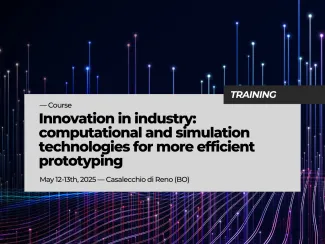
Today’s modern industry faces increasingly complex challenges in terms of design, prototyping, and optimization of production processes. To remain competitive in an ever-evolving global market, companies need advanced tools that enable them to reduce development time and costs, improve product quality, and boost operational efficiency.
The adoption of High Performance Computing (HPC) and advanced simulation techniques is revolutionizing the industrial sector, offering new opportunities for virtual modeling and digital prototyping.
But how can these technologies be effectively implemented within companies?
What skills are required to fully leverage the potential of supercomputing and Computational Fluid Dynamics (CFD)?
To address these needs, EuroCC Italy is launching the course “Innovation in Industry: Computing and Simulation Technologies for More Efficient Prototyping” — a two-day intensive training program designed to provide advanced expertise in parallel programming and the use of OpenFOAM, the leading open-source software for fluid dynamics simulation.
Innovation in Industry: Computing and Simulation Technologies for More Efficient Prototyping
📍 Location: Phygital Hub Gellify, Via Isonzo, 55/2, Casalecchio di Reno (BO)
🗓 Dates: Monday, May 12 and Tuesday, May 13, 2025
🎯 Format: In-person training with theoretical lectures and practical HPC and simulation sessions
🔗 Registration: Fill out the online form
📒 Download the course brochure
The course is structured into two complementary training modules:
- May 12, 2025 → Module 1: Parallel Programming: A Boost for Your Business Applications
- May 13, 2025 → Module 2: OpenFOAM: An Open-Source Tool for Virtual Prototyping
Module 1: Parallel Programming – A Boost for Your Business Applications
Date: May 12, 2025 | 9:00 AM – 6:00 PM
This module aims to introduce participants to parallel programming and the “Message Passing” and “Shared Memory” paradigms, essential for reducing solution times for complex applications and algorithms.
The course will be highly interactive, featuring several hands-on sessions on supercomputing systems.
The techniques learned can be applied both on-premises and in cloud-based corporate infrastructures.
Topics covered:
- Use of HPC resources
- Theory of parallelization
- Software scalability
- Multithread parallel programming with OpenMP
- Distributed parallel programming with MPI
Target Audience:
- Software developers
- Designers with an interest in virtual prototyping
Recommended Prerequisites:
Knowledge of a programming language (C/C++ or Python)
Why Participate?
Participants will acquire the essential skills needed to implement innovation strategies within their organizations, including:
- Knowledge of the main HPC technologies
- Understanding of shared memory parallel programming and OpenMP directives
- Understanding of distributed parallel programming (managing communications in MPI, processor groups, and topologies)
Module 2: OpenFOAM – An Open-Source Tool for Virtual Prototyping
Date: May 13, 2025 | 10:00 AM – 5:00 PM
The second module focuses on introducing the open-source computational software OpenFOAM and its direct applications in engineering virtual prototyping.
A brief theoretical overview of the finite volume method will be provided, followed by practical problem-solving exercises using OpenFOAM on increasingly complex fluid dynamics scenarios.
Topics covered:
- Use of HPC resources for simulation
- Theory of finite volume methods
- Introduction to OpenFOAM software
- Meshing with blockMesh and snappyHexMesh
- Solving a laminar flow problem
- Solving a laminar flow problem with thermal coupling
- Solving a turbulent flow problem
Target Audience:
Researchers and designers in the field of Computational Engineering who already use or intend to start using open-source computational tools for fluid dynamics modeling in HPC environments.
Recommended Prerequisites:
- Knowledge of continuum mechanics
- Familiarity with Linux
- Understanding of distributed parallel programming
- Knowledge of methods for solving linear systems
Why Participate?
The course will enable participants to:
- Gain fundamental knowledge and use of open-source tools for Computational Fluid Dynamics (CFD)
- Acquire basic competency in HPC utilization
- Understand key numerical methods and techniques for CFD
- Learn basic skills in pre-processing and post-processing tools